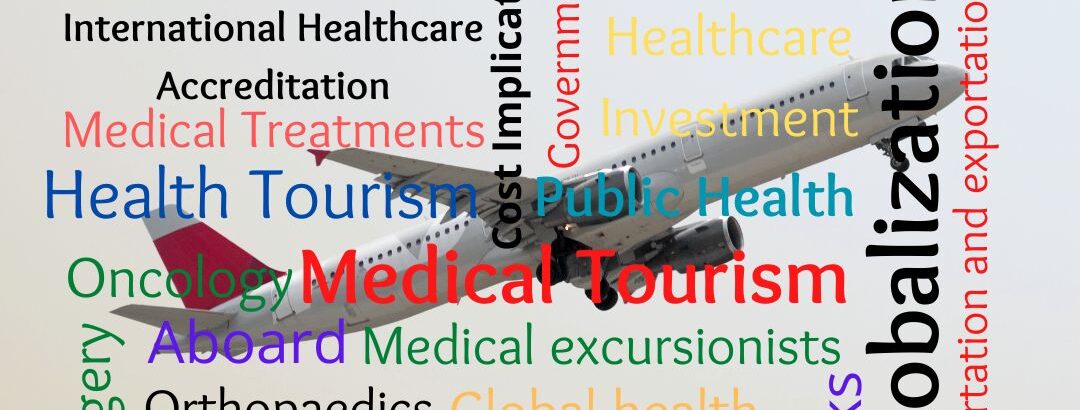Medical tourism – simply put – refers to people traveling abroad for medical treatment.
INTRODUCTION
In history, this generally appertain to those who travelled from under-developed countries to major medical centers in highly advanced countries for treatments perceived as “unapproachable” at home. Albeit, in recent times it may equally relate to those from developed countries, who travel to developing countries for “lower-priced” medical treatments. The motivation may also be for medical services unattainable or unlicensed in their home country.
Most frequently, medical tourism is done for surgeries (cosmetic and non-cosmetic) or similar treatments. People also travel for dental tourism, birth tourism and fertility tourism. Likewise, people with rare conditions may travel to countries where the treatment is very well understood. However, nearly all types of health care services – including psychiatry, alternative medicine, convalescent care, and even burial services – can be gotten via medical tourism.
Health tourism – on the other hand – is a wider term for trip that focuses on medical treatments and the use of healthcare services, also known as wellness tourism. But for the sake of this article, we will only talk about medical tourism in depth.
Globally, medical tourism has contributed immensely to the growth and development of the health care system and the countries that engage in it, because it attracts people from all over the world, thereby adding value to the countries involved. Medical tourism providers have also developed as “interposers” who unite corporate medical excursionists with surgeons, provider hospitals and other relevant associations.
HISTORY OF MEDICAL TOURISM
The first recorded case of people travelling for medical treatment dates back millennia ago to when Greek pilgrims travelled from the eastern Mediterranean to a small area in the Saronic Gulf called Epidauria (small city in Greece). Also, the early forms of medical tourism were to Spa municipalities and homes.
In the 18th-century, European patients visited spas because they were places with apparently “health-giving” mineral waters used in treating conditions such as gout, liver diseases and bronchitis. Spas were common all over Europe in places like Hungary, Austria, and Germany. The United States inherited this tradition, and numerous Americans travelled to natural springs in the southwestern regions around the 18th century as well. This practice is hardly unique to Europeans and Americans. In Japan, mineral springs have been used for centuries and in India, the practice may go as far back as 5,000 years ago.
From the time of the Ancient Greeks to our ultramodern period today, the reasons people engage in medical tourism have not exactly changed that much. These reasons include cost, treatment time, insurance content, the explicit knowledge or misunderstanding of an illness in patient’s native country.
INTERNATIONAL HEALTHCARE ACCREDITATION
International healthcare accreditation is the process of certifying a “position of quality” for healthcare providers and programs across multiple countries. International healthcare accreditation associations certify a wide range of healthcare programs such as hospitals, primary care centers, medical transport, and ambulatory care services. This is important to medical tourism, because it provides a standard measure and reassurance for good quality and safe healthcare globally.
There are a number of international healthcare accreditation schemes available in different countries around the world and the oldest international accrediting body is Accreditation Canada. Formerly known as the Canadian Council on Health Services Accreditation, they accredited the Bermuda Hospital Board as early as 1968. Since then, it has accredited hospitals and health service associations in ten other countries.
The different international healthcare accreditation schemes vary in quality, size, intent, skill and intensity of their marketing. Also, they vary in terms of cost to the hospitals and healthcare institutions making use of them.
MEDICAL TOURISM IN NIGERIA
Africans are high targets for medical tourism. In Nigeria alone, trip to India for healthcare generated greater than “260 million US$ in spending” in 2019. Patients also travel to other countries asides India – especially South Africa, Dubai, China, and Malaysia, as well as traditional destinations in the United Kingdom and the United States.
According to Price Waterhouse Coopers (2016) report, Nigerians spend $1 billion annually on medical tourism with 60% of it on four crucial specialties like: Oncology, Orthopaedics, Nephrology and Cardiology. This is nearly 20% of the total government spending on public health sector for that period, including hires of all public sector doctors, nurses and other healthcare workers, as well as other health programs like malaria, tuberculosis, polio and HIV/AIDS prevention. As the total government expenditure on health sector reported then stood at $5.85 billion.
Nigerians – with an estimated periodic spending of 1 to 20 billion US dollars on medical tourism – are huge contributors to this industry. Numerous Nigerians travel to countries such as India and UK for various treatments including cardiac surgeries, neurosurgeries, cosmetic surgeries, orthopedic surgeries, and renal transplant surgeries.
Going down memory lane, in 2005, the Nigerian President wife died after undergoing a cosmetic surgery in Spain. More recently in June 2016, the current president of the country travelled to the UK in order to attend to a “persistent ear infection” – despite the number of ENT (Ear, Nose and Throat) specialists and a national ear hospital in the country. Similarly, lots of prominent Nigerians have continued to travel overseas for medical services, even though the country is able of treat their ailments – they always look for an alternate option outside the country.
RISKS ASSOCIATED WITH MEDICAL TOURISM
While medical tourism could give access to health care services that aren’t available in departure countries, several issues such as cost of service, follow-up after surgery, quality of care, and adverse effects are challenges that have plagued the industry worldwide.
Medical tourism carries some pitfalls that “locally provided medical care” either doesn’t carry or carries to a lower degree. A study reported that nine of 23 cases (39%) who presented at a healthcare facility in Nigeria after receiving neurosurgical care outside the country, failed from complications of the procedures they had undergone. Upon return to the country, over a quarter of these cases presented with infections challenging follow-up care that wasn’t originally planned and that incurred unplanned charges, which pushed the cost of care to extremely high and situations.
Medical tourists, in their shot to seek care, are exposed to contagious microbes that are uncommon in their native surroundings, thereby easing the transfer of these contagious agents across geographic boundaries. These nosocomial infections acquired abroad can cause devastating outbreaks in their home countries where essential immunity to similar microbes is missing.
Recognizing the financial viability of Nigeria as a source of medical tourists, MTF (Medical Tourism Facilitators) agencies have moved into the country to have direct access to the population. This trend now also includes physicians who are approached with a request to refer patients to specific practices outside the country and in return receive some financial inducements. Although little has been proved about physicians acting as MTFs or their agents around the world, referrals to more advanced centers have been a worldwide practice of service delivery. However, these international referrals and patient recruitments are increasing with globalization and might be open to abuse.
Furthermore, the limited nature of legal sanctions in various countries is a reason for accessibility of care overseas. While some countries presenting themselves as “very pleasant medical tourism destinations” provide some form of legal remedies for medical malpractice, these provided legal avenues may be unpleasing to the medical tourist. Should problems arise, patients might not be covered by adequate personal insurance or might be unfit to seek compensation via malpractice lawsuits.
Likewise, the quality of post-operative care can also vary dramatically, depending on the health clinic and country, e.g., the US standards may differ from the European standards. Also, traveling long distances soon after surgery can increase the risk of complications. Long flights and reduced mobility associated with window seats can predispose one towards developing deep vein thrombosis and potentially a pulmonary embolism that can led to death.
Similarly, patients traveling to countries with less strict surgical standards may be at high risk for complications. However, the patient may need to stay in the foreign country for longer than planned or if they’ve returned home; they might not have easy access to follow up care, if there are any complications.
RECOMMENDATIONS
The Nigerian government needs to improve the nation’s health sector, so as to prevent patients from taking long flights to other developing countries for health care treatment. Improved health care system in the country will also prevent risks of people coming in with foreign pathogens after they had sought out health care overseas.
A standard health care system will likewise attract foreign nationals to invest in the country, thereby inviting medical tourists into the country to seek health care. This will definitely boost the country’s economy, as it is a form of tourism i.e., reverse medical tourism.
Invariably, Medical tourism needs to be looked into, either as a way of boosting the economy or as a way of preventing more expenses.
Although several hospitals in the country carry out specialized surgeries – due to the belief that getting treatment overseas is far better than getting treatment in Nigeria – these hospitals are hardly patronized, especially by top national executives who should be ambassadors of the nation. Hence, the common saying that “hospitals in Nigeria are not as standard as hospitals abroad” should be critically looked into and proactively worked on to reduce the cost implication and risk associated with seeking medical care abroad.
REFERENCES
https://guardian.ng/features/quality-investment-in-health-sector-only-solution-to-stopping-medical-tourism/
https://en.m.wikipedia.org/wiki/Medical_tourism
https://www.ncbi.nlm.nih.gov/pmc/articles/PMC4337373/
https://guardian.ng/news/nigeria-loses-over-n576b-yearly-to-medical-tourism/

About Author:
Nofisat Bukola Akinremi (BSc. Microbiology, MSc. Ecotourism) is a medical microbiologist and passionate advocate for SDGs, ecology and biodiversity.




